With a hand still across his mouth, and the other sleeved, Auster prods at Papias with his foot. Papias goes, and falls into the street, and lies there, shaking still and tearing at himself until the time later when Kester finds him.
Now.
Now might you bring the world to end.
Your servants wait.
John alls. What fortitude and changeless health he had on the island are no more. Martha and Ruth attend him. He is cleansed and wears a fresh white robe where he lies on the bed. For many hours of the day, while the disciples are elsewhere carrying the Word, he remains in a cave of silence. Sometimes, hearing the whispered voices of the children, he raises his head from stillness and tells Martha to let them come to him. They stand by the bed and he is changed by their attendance. His hands take theirs; he smiles as if at this proof of innocence in the world yet.
'Who am I?' he asks them.
'You are John, son of Zebedee, disciple of our Lord Jesus Christ.'
The days are long. The summer burns itself in brilliant heat, but in the stone room where he lies it is shaded and cool. There he waits. Is each breath he draws numbered? Is there an appointed time when the Lord will come? What moment marks it? What configuration of stars, what height the sun, heralds the opening of the heavens? Or will there be no notice, no annunciation but one instant in ordinary time when the sky parts and he is there?
'I will not leave you comfortless, I will come to you,' he remembers.
Then he says this over soundlessly in his mind. I will not leave you comfortless, I will come to you. And again. His thin, dry lips move minutely. His blind eyes are turned away, angling to the right, to the space above him, where he can see then the face of Jesus as he said the words.
Kester comforts Papias. The disciple pulls back from him and tries to hide himself and the disease, but the mute sees and is unafraid. At his side he has a bundle in which he carries the things he steals. From this he takes a pouch. He gives Papias lemon water to drink, sits in the street a long time with him until he is calmed.
Having drunk, Papias will not return to him the water pouch. 'I am unclean, you must not take it. You must not drink from it after me.'
He puts it on the ground. Kester the thief picks it up.
Papias clings to his knees, rocks himself in desolation. Where should he go now? What can he do? The gospel he has read sickens him in his spirit. He does not believe it. It cannot be true. That was not the gospel of the true John. It was written for sale, for trading to the credulous. The beloved disciple is in the house of Levi. He is the apostle John. I believe it. I believe it. I believe it. That was nothing. It was deceit and lies.
But still his spirit sickens. The contagion eats further inches of his chest. He thinks his skin smells of death. How can he go back to the Apostle now?
At sunset the others note that he has not returned. But it is supposed he accepts the hospitality of a Christian and will be back in the morning. Nonetheless, the Apostle is concerned. With assistance he sits upright. 'Where was Papias going?' he asks.
None are certain. 'To the east of the city,' Danil tells.
'We pray for him,' says John.
After a deep quiet full of disquiet, John asks the news of Ephesus then lies back to listen. In the telling he hopes for signs, but cannot say so.
The discourse is quickly impassioned. The disciples speak of the splintered world. 'There are a thousand creeds, and more each day,' Lemuel says. 'Everywhere there are ones obscured by darkness.'
'I am sad to confess, the world hates us still,' Meletios says.
'But there are believers in Jesus,' Danil argues.
'Yes, but what Jesus?' Lemuel asks. 'They number him no different from other prophets. He is another they can petition, no more than this.'
'But is not this a beginning?'
'No. They understand nothing of what we teach.'
'And the scribes and the chief priests, they speak against us still no different from before,' Meletios says.
'But there are some in the synagogue,' Danil says. 'remains in a cave of Chiram and one Eben, who confessed to me they believed in Jesus but could not say so in public for fear of being driven from the temple.'
Lemuel shakes his head. 'We must teach otherwise. They prefer the praise of men to God.'
'Yes, but. .' Danil shrugs at the old bell ringer. 'The work to come is still long.'
'That Jesus is a teacher is most easily understood. But this is not belief. They sit to a sacred meal but do not understand the Eucharist. Our gains are small.'
'Should we not be content that they receive us?' Meletios essays hopefully. 'That some there are who listen?'
'But what comfort is in this?' Lemuel asks. 'I can number on my fingers the ones who believe truly: Gaius, Demetrios, the young follower Polycarp, who asks that he come to see the Apostle.'
'Let him to come,' John says.
'You are weak still, Master. You should not be taxed with visitors.'
'Let who would come, to come. I would see all my brothers in Christ. We are a communion. We need not walls to keep others out.'
The discourse falls quiet. The sun has set. The disciples sit enlarged by their shadows. In what they are engaged seems enterprise of vast dimension and they are small and human only.
'Let us pray,' John says.
They do. Their praying is old solace, comfort ancient as time, as man's first petitioning into the first night.
An hour passes, another. They say the words of psalms, of scriptures in usage immemorial, lines once chanted in desert and plain, in the dust wherein grew cities that now are dust again. A single voice rises and the others join. A pause follows. Then, without indication, another amongst them begins a new prayer. So the dark is measured. They do not conclude. None move away to sleep. The Apostle is awake and prays with them.
And in that time, between dark and dark, when there is nothing but the bare bowed spirits of these men, there comes to John a frail light. He is moved by love. It comes to him at first as the deepest pity, that these have not seen Jesus as he has, and yet they follow. Their faith near makes him weep, and he feels for each one an unsay able love, within which is gratitude, pride, admiration, wonder, mystery, sympathy, surprise, all tender variants of affection. It wells up and floods the chambers of him as an inner tide. He is overcome. In his darkness then an epiphany: such love he must not fail. It is as simple as this, for epiphany is foremost marked by simplicity, by the condition of claritas. He sees as he has not before. Such love he must not fall.
Into the silence, he tells, 'Brothers, my brothers in Christ, unto the last hour, yea, unto the last moment of the last hour, you will teach the Word that others may be saved. In this is the love of God, that you teach the love of God. That you show the way, the way will be shown to you, and to all who find you. Though it is the last hour, we do not labour less, but more.'
He pauses. His voice is strengthened.
'I would that one of you would write these words,' he says.
Startled, as if from dream into the thing dreamt, the disciples bestir themselves. Danil lights a candle, Lemuel brings papyrus and stylus, offers these to Meletios, whose hand is fairest.
Then, to instruct, to clarify, to lead into light, to assist those he loves in their labours, which labours he knows will continue to the end of time, John dictates his great epistle. He writes to the world. He speaks clearly, with certain pause, each thought delineated with care.
'That which was from the beginning, which we have heard, which we have seen with our eyes, which we have looked upon, and our hands have handled, of the Word of life. .'
Читать дальше










